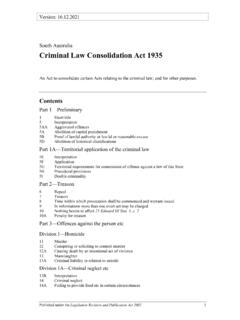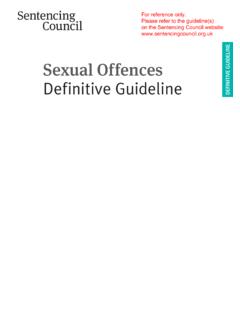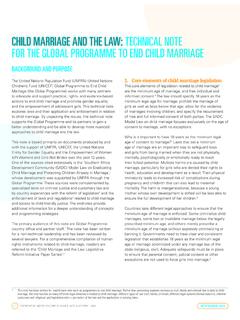Transcription of CODE OF CONDUCT FOR TEACHERS - UNESCO
1 TEACHERS ' CODE OF CONDUCT . RULES OF PROFESSIONAL CONDUCT . FOR TEACHERS IN GHANA. For Presentation to the Ministry of Education and Ghana Education Service (GES). July 2008. CEDEM. This publication was made possible through support provided by the Office Women in Development, Bureau for Economic Growth, Agriculture and Trade, Agency for International Development to the grantee AED-Ghana: Centre For Educational Development, Evaluation And Management under the terms of Contract No: GEW-I-02- 02-00019-00. The opinions expressed herein are those of the author(s) and do not necessarily reflect the views of the Agency for International Development or the United States Government.
2 CEDEM. TEACHERS ' CODE OF CONDUCT . RULES OF PROFESSIONAL CONDUCT . FOR TEACHERS IN GHANA. With input from: The National Review Committee and community groups The following individuals and organisations participated in the creation of this document: Institutions forming the National Review Committee on the TEACHERS ' Code of CONDUCT : Ghana Education Service (GES), Ghana National Association of TEACHERS (GNAT), teacher and Educational Workers Union (TEWU), National Association of Graduate TEACHERS (NAGRAT), Ghana Education Service Council, National Youth Council and Ministry of Women and Children's Affairs (MOWAC).
3 Community participants from Ajumako-Enyan-Essiam, Assin North and Assin South Districts. Stakeholders in education in all ten regions of Ghana. 1. TABLE OF CONTENTS. PART 1: INTRODUCTION .. 4. PART 2: GENERAL DEFINITION OF MISCONDUCT ..6. PART 3: RULES OF CONDUCT FOR TEACHERS ..7. PART 4: PENALTIES .. 16. PART 5: RESPONSE TO 20. PART 6: LEVELS OF AUTHORITY FOR IMPOSING PENALTIES .. 25. PART 7: 26. PART 8: MISCELLANEOUS .. 27. 28. 2. LIST OF ABBREVIATIONS. CoC Code of CONDUCT CEDEM AED-Ghana: Centre For Educational Development, Evaluation And Management CHRAJ Commission on Human Rights and Administrative Justice CRC Convention on the Rights of the Child GES Ghana Education Service GNAT Ghana National Association of TEACHERS MOWAC Ministry of Women and Children's Affairs NAGRAT National Association of Graduate TEACHERS NRC National Review Committee PTA Parent teacher Association SMC School Management Committee SRGBV School-related gender-based violence SSSC Safe Schools Sub Committee TEWU TEACHERS ' and Educational Workers' Union 3.
4 CODE OF CONDUCT FOR TEACHERS . PART 1: INTRODUCTION. 1. The education of the children of this country has been largely entrusted into the hands of the members of the Ghana Education Service. This places members of the Service, whatever their role, in a special position of responsibility, which requires exceptionally high standard of behaviour and CONDUCT . 2. As articulated in the United Nations Convention on the Rights of the Child (CRC) which was ratified by Ghana in 1990 and the Children's Act of 1998 (Act 560), children in Ghana have a right to education and should be free from being subjected to harmful or degrading punishment and any type of violence or exploitative labour that shall deny the child of his/her right to education.
5 TEACHERS , as duty bearers and members of Ghana Education Service have a responsibility to uphold and protect children's rights. 3. The Ghana Education Service accepts this responsibility and pledges to seek at all times to maintain the highest standard of competence and good behaviour. 4. To this end, the Ghana Education Service finds it necessary to codify certain norms that help it achieve this high standard of competence and good behaviour. 5. This Code of CONDUCT has been drawn up for the guidance of the TEACHERS of the Ghana Education Service including those engaged in administration, teaching and other supporting services in the performance of their duties.
6 6. This Code provides a frame of reference for both the disciplinary authority and members of the Service when it becomes necessary to initiate disciplinary action against erring members. 7. This Code of CONDUCT should not be viewed primarily as a means of imposing sanctions but also designed to emphasize and encourage improvements in individual CONDUCT . 8. The rules and regulations in this Code should not be regarded merely as a catalogue of offences and penalties or negatively as constituting restraint on member's freedom. They are meant to ensure that the conditions for effective teaching and learning are created and maintained in the country's educational institutions as well as to inspire public confidence in TEACHERS to whom is entrusted the physical, mental, moral, religious and spiritual up-bringing of the country's children.
7 9. Since the Code constitutes rules for regulating the CONDUCT of TEACHERS both in and outside the classroom, it has been reviewed to follow modern trends to incorporate school-related gender-based violence (SRGBV). 10. In this document, School-related gender-based violence refers to all forms of violence perpetrated against school going girls and boys, which results in their sexual , physical or 4. psychological harm. It includes any form of violence that is based on gendered stereotypes or that targets students on the basis of their sex. It includes, but is not limited to: bullying, corporal punishment, verbal harassment, sexual comments, sexual touching, defilement and rape.
8 Violence can take place in the school, on the school grounds, going to and from school, or in school dormitories and may be perpetrated by TEACHERS , students or community members. Both girls and boys can be victims as well as perpetrators. Such violence can affect the well-being of students, putting them at greater risk of educational failure through absenteeism, dropping out and lack of motivation for academic achievement. It also impacts their mental and physical health, resulting in physical injury, pregnancy, sexually transmitted infections (including HIV/AIDS) or emotional/psychological ill-health.
9 11. The Code also includes guidelines on the appropriate response to allegations by pupils/students of SRGBV whether by TEACHERS or fellow pupils/students including sections relating to the accessible school procedure by which pupils/students can make confidential complaints, the prompt and effective investigation of such complaints as well as prompt and appropriate procedure for reporting. 5. PART 2: GENERAL DEFINITION OF MISCONDUCT. 1. CONDUCT : i. CONDUCT in this context is behaviour, attitudes and character exhibited, for example, by anyone within and outside the working environment. The standards of CONDUCT generally required of any member of the Ghana Education Service (GES) would be leadership, selflessness, comportment, integrity, impartiality, fairness and honesty in matters affecting work and status of the profession.
10 Ii. Any act of omission without reasonable excuse by an employee that amounts to a failure to perform in a proper manner any official duty assigned to him or her as such or that contravenes any rules of regulations or enactment relating to the Education Service or that is otherwise prejudicial to the efficient CONDUCT of the Education Service into disrepute shall constitute a misconduct. iii. The setting forth in the following sections of particular types of misconduct shall not be taken to affect the generality of the sub-sections (i) and (ii) of this section. 2. The types of misconduct set out in the Code are not exhaustive and therefore make room for other misconducts that have not been addressed herein.






